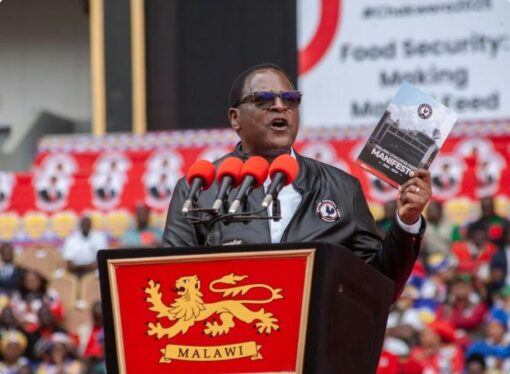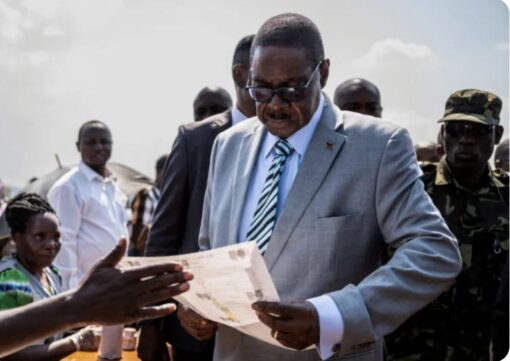Malawi has entered a new political chapter after President Lazarus Chakwera conceded defeat to his predecessor, Peter Mutharika, in one of the most closely contested elections in the nation’s recent history.
In an address that emphasized respect for the will of the people and the constitution, Chakwera acknowledged that his rival had built what he described as “an insurmountable lead” and confirmed he would oversee a peaceful transfer of power. The move has set the stage for Mutharika, now 85, to make an extraordinary political return five years after leaving office.
The Malawi election 2025 unfolded against the backdrop of a severe economic crisis that left voters angry and disillusioned. For weeks leading up to the vote, frustration over soaring inflation, fuel shortages, and food insecurity dominated the national conversation.
Inflation has climbed to 33 percent, while maize and fertilizer prices, critical for the country’s agricultural base, skyrocketed beyond the reach of most households.
According to the World Bank, nearly three-quarters of Malawians live on less than three dollars a day, and half of the population does not consume the minimum number of daily calories required for survival. Against this backdrop of despair, Mutharika’s message of economic stability and infrastructure development gained traction.
Chakwera, 70, had swept into power in 2020 with promises of reform, integrity, and a crackdown on corruption. His victory came after a historic moment in Malawian democracy, when the constitutional court annulled Mutharika’s 2019 win due to electoral irregularities and ordered a rerun.

That rerun catapulted Chakwera to the presidency, hailed as a triumph for African democracy. But five years later, critics accused his administration of indecisiveness and selective justice in pursuing corruption cases.
His slow handling of scandals, combined with the economic freefall, eroded public trust. By the time voters headed to the polls this September, many viewed him as out of touch with the struggles of ordinary citizens.
For Mutharika, the comeback represents vindication. During his presidency between 2014 and 2020, he was credited with stabilizing inflation and launching infrastructure projects that boosted connectivity.
Supporters say he is the pragmatic choice in a moment of crisis, while detractors recall allegations of cronyism and patronage networks that marred his leadership. Despite these controversies, the image of Mutharika as a steady hand on the economy resonated with voters weary of promises that went unfulfilled under Chakwera.
The Malawi election 2025 was fiercely competitive, with polling stations across the country witnessing long queues and enthusiastic turnout.
Citizens expressed both hope and frustration, determined to make their voices heard despite shortages of fuel that hampered transportation.
Observers noted that the race between the two men was not just about personalities but about competing narratives of leadership—Chakwera as the reformer who failed to deliver, and Mutharika as the experienced elder promising stability.
As preliminary results showed Mutharika pulling ahead, the atmosphere in Lilongwe shifted from tense anticipation to quiet acceptance.
Chakwera’s concession speech struck a tone of humility and statesmanship. “It is only right that I concede defeat out of respect for your will as citizens and out of respect for the constitution,” he said, pledging to ensure a peaceful transfer of power.
His words were welcomed by regional leaders and international partners, who praised the commitment to democratic norms in a region where election disputes often turn violent.
Still, the road ahead is fraught with challenges. Malawi’s economy is battered, its debt burdens rising, and its citizens grappling with hunger.
The fuel shortages that paralyzed daily life in the run-up to the election remain unresolved. For Mutharika, the challenge will be to demonstrate quickly that his leadership can reverse the slide. Expectations are high, and disappointment could ignite unrest if solutions do not materialize soon.
Chakwera’s legacy, though bruised by the loss, is not without significance. His willingness to concede sets a precedent for peaceful political competition in a nation that has now experienced both the annulment of a fraudulent election and the acceptance of electoral defeat by an incumbent. For many Malawians, that democratic maturity is itself a point of pride, even amid the hardships.
International observers will be watching Mutharika closely. At 85, his age raises questions about succession planning and whether he can sustain the demands of office in such a difficult environment.
His supporters argue that his experience is precisely what Malawi needs, but critics say the country risks recycling old leadership instead of charting a new course. Still, in this moment of economic pain, many voters appeared less concerned with generational change and more focused on survival.
The concession of the incumbent also places Malawi in sharp contrast with other African nations where leaders have clung to power despite electoral defeat.
Regional analysts note that this peaceful transfer of power bolsters Malawi’s democratic credentials, potentially strengthening its position with international donors and institutions that remain critical to its financial stability.
However, donors are likely to press the new government to pursue reforms and anti-corruption measures as a condition for assistance, setting up potential clashes with entrenched political interests.
For the average Malawian, the immediate concern remains the economy. With food prices soaring and wages stagnant, families are struggling to make ends meet.

The hope is that Mutharika can leverage his past record to restore confidence and stabilize the economy, though it remains to be seen whether the structural problems can be addressed swiftly enough to meet the urgency of the crisis.
The Malawi election 2025 has therefore marked both continuity and change. Continuity in that power has returned to a former leader, change in that the democratic process functioned smoothly, with an incumbent conceding and the people’s voice prevailing.
Whether this moment leads to national renewal or further disappointment will depend on the choices Mutharika makes in his second act as president.
In the coming days, the Electoral Commission will finalize and announce the official tally, but Chakwera’s concession has already confirmed the outcome.
Across the country, Malawians are digesting the implications of their decision. In villages and cities alike, the conversations return to the same themes: the cost of maize, the price of fertilizer, the scarcity of fuel, and the daily grind of survival. For them, politics is not abstract—it is tied directly to whether children will eat, farmers will plant, and businesses will endure.
As Mutharika prepares to take office, the challenges are immense but so too are the expectations. Malawi has once again demonstrated resilience in its democratic institutions. Now, the question is whether its leaders can translate that resilience into policies that lift millions out of poverty and chart a path toward a more secure and prosperous future.


